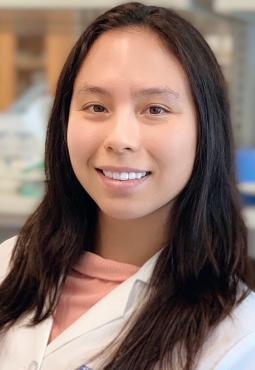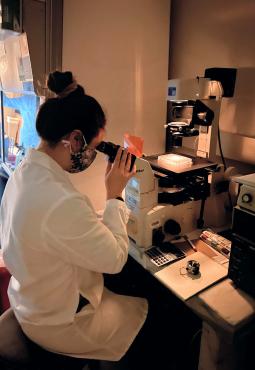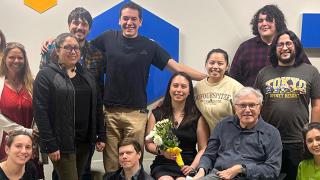As an undergraduate student, Elizabeth Epps was already interested in the science and biology of HIV when a close friend revealed he was HIV positive. That motivated her to focus her graduate studies on long-term HIV therapy.

“What can I do to help?” Epps recalled thinking as she prepared for graduate school. “I was determined to find a lab that focused on more curative types of HIV treatments.” That’s when a family friend introduced her to City of Hope’s Alexandra Levine, M.D., M.A.C.P., an acclaimed expert in blood cancers and HIV-related malignancies. “One meeting with Dr. Levine opened lots of doors for me to network with a variety of researchers and scientists,” Epps said. She spent the next eight years earning a doctorate degree at City of Hope’s Irell & Manella Graduate School of Biological Sciences.
On June 9, Epps will walk in City of Hope’s 25th commencement ceremony as part of the school’s graduating class of 2023. City of Hope is in the top 30 percentile of graduate schools in the biological sciences, according to U.S. News & World Report.
“City of Hope is honored to be recognized by U.S. News & World Report for our stellar graduate education that has again produced an accomplished group of graduates,” said David K. Ann, Ph.D., dean of City of Hope’s graduate school and the Morgan & Helen Chu Dean’s Chair of the Graduate School of Biological Sciences. “We congratulate them as they contribute their experience and knowledge to top biotech companies, federal agencies and comprehensive cancer centers, and serve as biomedical leaders dedicated to discovering lifesaving treatments for patients.”
Epps is the first in her family of five to earn a postdoctoral degree. She earned her bachelor’s degree in human biology from the University of California San Diego. Prior to enrolling in City of Hope’s graduate school, Epps was a research associate at City of Hope’s Center for Gene Therapy, focusing on preclinical HIV gene therapy research.
Homing In on Cellular Therapies
During graduate school rotations, Epps landed in the lab of John Rossi, Ph.D., professor and director of the Center for RNA Biology and Therapeutics, dean emeritus of the graduate school and the Lidow Family Research Chair.

In Rossi’s lab, Epps studied the development of RNA-based lentiviral therapies, a type of gene therapy that, ironically, allows researchers to use a nonreplicating, lab-derived strain of HIV to safely insert desirable genetic material into cells. This technology has paved the way for several revolutionary gene therapies to either remove undesirable genes or insert desirable ones into patients to treat illnesses caused by abnormal gene expression. City of Hope’s own CAR T cell pipeline uses lentiviruses to deliver lifesaving receptors into patient-derived T cells to help target and kill cancer cells.
In addition to other lentiviral production and T cell therapy applications, Epps studied the role of the transcription factor YY1 on CD19 CAR T cell function and found that, with vital proteins like YY1, nuanced gene expression differences can cause dramatic effects on cellular phenotype and activity.
She hopes this research can inform other budding scientists on the scope and breadth of possible projects available to students at City of Hope.
“I was excited to get Dr. Rossi’s guidance, learn new skills and further apply them to my own research,” Epps said. “During my time in Dr. Rossi’s lab, I was also mentored by a number of brilliant scientists who taught me to think critically and independently.”
Pursuing a Career in Biotech
As a City of Hope graduate student, Epps has co-authored four research articles, ranging from HIV gene therapies to liver cancer therapeutics. These findings have informed ongoing preclinical research at
City of Hope, as well as contributed to the fields of cellular gene therapy and cancer biology overall.
Epps also completed a certificate in bioscience management through a joint program with the Keck Graduate Institute, which inspired her to further broaden her career goals after graduate school.
Epps plans to pursue a career in the biotechnology industry and apply her education and experience to advance therapeutic benefits for cancer patients, including minimizing treatment side effects, increasing therapeutic efficacy and improving overall quality of life. She attributes some of her success as a scientist to her husband Ryan Setten, Ph.D., who is also an alumnus of City of Hope’s graduate school. He currently works in San Diego’s biotech hub, and she hopes to join one of those companies as well.
City of Hope’s Irell & Manella Graduate School of Biological Sciences is accredited by the accrediting agency WASC Senior College and University Commission. It offers doctorate degrees in biological sciences and translational medicine and master’s degrees in regulatory affairs, as well as translational medicine through a joint program with the Keck Graduate Institute.
Pictured above: Epps, center, with John Rossi, Ph.D., seated at right, and other members of the graduate school.
